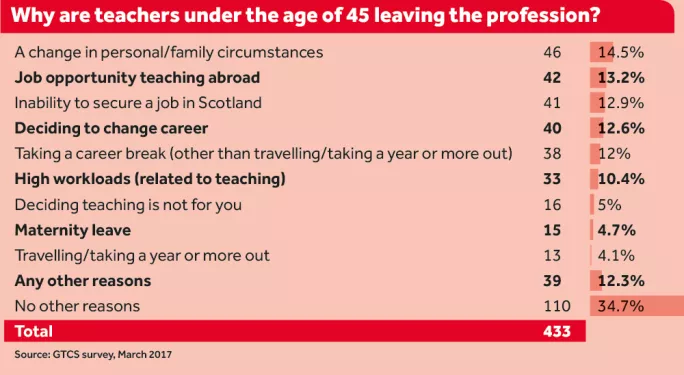Pay and promotion blamed as hundreds of teachers exit

Scotland’s teaching watchdog is investigating why hundreds of teachers, decades away from retirement, are quitting the profession every year by letting their registration lapse.
The move comes as Scottish Secondary Teachers’ Association (SSTA) president Euan Duncan is today set to claim that insufficient pay and promotion opportunities are to blame.
To teach in Scottish schools, teachers must be registered with the General Teaching Council for Scotland (GTCS). Last year, 752 teachers aged between 21 and 45 lapsed from the register - a figure that is roughly equivalent to previous years, according to the council. Due to concerns about teacher recruitment, the GTCS has commissioned research to find out why these staff fail to continue their registration.
Mr Duncan is set to claim in his speech to the union’s annual congress in Crieff today that the reason is that pay and promotion opportunities “are simply not keeping up”. He will call for a debate on how “the flatter promotion structure, which has drifted into place in teaching”, can include “a few more rungs”.
Mr Duncan is also expected to tell the SSTA congress: “It is surely no coincidence that, as opportunities for career progression have dwindled, recruitment and retention have become more difficult. A few talented individuals may rise to the top, helium-style, but for many other excellent practitioners, the wind is taken out of their sails through lack of opportunity.”
Ahead of his speech, he also told Tes Scotland that despite much discussion in Scottish education circles about attainment and reform, there was “a tremendous need to get the wellbeing and development of teachers on to the agenda”.
‘Hard evidence’
The chartered teacher post, introduced so that teachers could earn more without leaving the classroom, was scrapped in 2012. And in recent years, councils have moved from having individual principal teachers of subjects to faculty heads responsible for a larger number of subjects - effectively reducing the number of leadership posts.
According to figures in this year’s teachers’ pay claim, promoted posts in Scottish schools have dropped by 12 per cent in five years. From 2010 to 2015, the number of promoted posts has declined in primary schools from 4,898 to 4,585; in secondary schools from 8,216 to 6,980; and in special schools from 495 to 449.
However, according to the GTCS, a lack of promotion opportunities is “not a driving factor” for teachers allowing their registration to lapse. Rather, the body’s early research findings have so far indicated that the most common reasons for failing to renew registration, cited by teachers, are a change in personal or family circumstances; securing a job abroad; an inability to get a job in Scotland; changing career; taking a career break; and workload.
The GTCS said it hoped that by shining a light on the reasons why teachers leave the profession, its research would help to improve staff retention. A GTCS spokesman said the council was looking for “any hard evidence that might help the Scottish government and other agencies, including the GTCS, to help people stay in teaching and/or come back to teaching having lapsed”.
Last year, the Scottish government worked with local authority umbrella body Cosla to establish the number of unfilled teaching posts in Scottish schools and strengthen the annual workforce-planning exercise; the results revealed about 260 full-time and part-time teacher vacancies exist in primary and around 400 full-time and part-time vacancies in secondary. About 330 temporary teaching posts were also unfilled across both sectors.
GTCS chief executive Ken Muir will discuss the findings of the council’s research further when he appears before the Scottish Parliament’s education committee next week, as it continues its inquiry into teacher workforce planning.

You need a Tes subscription to read this article
Subscribe now to read this article and get other subscriber-only content:
- Unlimited access to all Tes magazine content
- Exclusive subscriber-only stories
- Award-winning email newsletters
Already a subscriber? Log in
You need a subscription to read this article
Subscribe now to read this article and get other subscriber-only content, including:
- Unlimited access to all Tes magazine content
- Exclusive subscriber-only stories
- Award-winning email newsletters